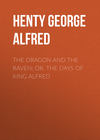Читать книгу: «A March on London: Being a Story of Wat Tyler's Insurrection»
CHAPTER I
TROUBLED TIMES
"And what do you think of it all, good Father?"
"'Tis a difficult question, my son, and I am glad that it is one that wiser heads than mine will have to solve."
"But they don't seem to try to solve it; things get worse and worse. The king is but a lad, no older than myself, and he is in the hands of others. It seems to me a sin and a shame that things should go on as they are at present. My father also thinks so."
The speaker was a boy of some sixteen years old. He was walking with the prior in the garden of the little convent of St. Alwyth, four miles from the town of Dartford. Edgar Ormskirk was the son of a scholar. The latter, a man of independent means, who had always had a preference for study and investigation rather than for taking part in active pursuits, had, since the death of his young wife, a year after the birth of his son, retired altogether from the world and devoted himself to study. He had given up his comfortable home, standing on the heights of Highgate—that being in too close proximity to London to enable him to enjoy the seclusion that he desired—and had retired to a small estate near Dartford.
Educated at Oxford, he had gone to Padua at his father's death, which happened just as he left the university, and had remained at that seat of learning for five years. There he had spent the whole of his income in the purchase of manuscripts. The next two years were passed at Bologna and Pisa, and he there collected a library such as few gentlemen of his time possessed. Then Mr. Ormskirk had returned to England and settled at Highgate, and two years later married the daughter of a neighbouring gentleman, choosing her rather because he felt that he needed someone to keep his house in order, than from any of the feeling that usually accompanies such unions. In time, however, he had come to love her, and her loss was a very heavy blow to him. It was the void that he felt in his home as much as his desire for solitude, that induced him to leave Highgate and settle in the country.
Here, at least, he had no fear of intrusive neighbours, or other interruptions to his studies. The news from London seldom reached his ears, and he was enabled to devote himself entirely to his experiments. Like many other learned men of his age, it was to chemistry that he chiefly turned his attention. His library comprised the works of almost every known writer on the subject, and he hoped that he might gain an immortal reputation by discovering one or both of the great secrets then sought for—the elixir of life, or the philosopher's stone that would convert all things into gold. It was not that he himself had any desire for a long life, still less did he yearn for more wealth than he possessed, but he fondly believed that these discoveries would ameliorate the condition of mankind.
He did not see that if gold was as plentiful as the commonest metal it would cease to be more valuable than others, or that the boon of a long life would not add to the happiness of mankind. For some years he gave little thought to his son, who was left to such care as the old housekeeper and the still older man-servant chose to bestow upon him, and who, in consequence, was left altogether to follow the dictates of his own fancy. The child, therefore, lived almost entirely in the open air, played, tussled, and fought with boys of his own age in the village, and grew up healthy, sturdy, and active. His father scarcely took any heed of his existence until the prior of the Convent of St. Alwyth one day called upon him.
"What are you going to do with your boy, Mr. Ormskirk?" he asked.
"My boy?" the student repeated in tones of surprise. "Oh, yes; Edgar, of course. What am I going to do with him? Well, I have never thought about it. Does he want anything? My housekeeper always sees to that. Do you think that he wants a nurse?"
"A nurse, Mr. Ormskirk!" the Prior said with a smile. "A nurse would have a hard time with him. Do you know what his age is?"
"Four or five years old, I suppose."
"Nearly double that. He is nine."
"Impossible!" Mr. Ormskirk said. "Why, it is only the other day that he was a baby."
"It is eight years since that time; he is now a sturdy lad, and if there is any mischief in the village he is sure to be in it. Why, it was but three days ago that Friar Anselmo caught him, soon after daybreak, fishing in the Convent pool with two of the village lads. The friar gave them a sound trouncing, and would have given one to your son, too, had it not been for the respect that we all feel for you. It is high time, Mr. Ormskirk, that he was broken of his wild ways and received an education suited to his station."
"Quite so, quite so. I own that I have thought but little about him, for indeed 'tis rarely that I see him, and save that at times his racket in the house sorely disturbs my studies, I have well-nigh forgotten all about him. Yes, yes; it is, of course, high time that he began his education, so that if I should die before I have completed my discoveries he may take up my work."
The Prior smiled quietly at the thought of the sturdy, dirty-faced boy working among crucibles and retorts. However, he only said:
"Do you think of undertaking his education yourself?"
"By no means," Mr. Ormskirk said, hastily. "It would be impossible for me to find time at present, but when he has completed his studies I should then take him in hand myself, make him my companion and assistant, and teach him all that is known of science."
"But in the meantime?"
"In the meantime? Yes, I suppose something must be done. I might get him a tutor, but that would be a great disturbance to me. I might send him up to the monastery at Westminster, where the sons of many gentlemen are taught."
"I doubt whether the training, or rather want of training, that he has had would fit him for Westminster," the Prior said, quietly. "There is another plan that perhaps might be more suitable for him. One of our brethren is a scholar, and already three or four of the sons of the gentry in the neighbourhood come to him for three hours or so a day. Our convent is a poor one, and the fees he receives are a welcome addition to our means."
"Excellent!" Mr. Ormskirk said, delighted at the difficulty being taken off his shoulders, "It would be the very thing."
"Then perhaps you will speak to the boy, and lay your orders upon him," the Prior said. "He was in the village as I passed by, and I brought him up here, very much against his will I admit. Then I gave him in charge on arrival to your servitor, knowing that otherwise the young varlet would slip off again as soon as my back was turned. Perhaps you will send for him."
Mr. Ormskirk rang a bell. The housekeeper entered.
"Where is Andrew?" he asked.
"He is looking after Master Edgar, sir. His reverence told him to do so, and he dare not leave him for a moment or he would be off again."
"Tell Andrew to bring him in here."
A minute later the old servant entered with the boy. Edgar was in a dishevelled condition, the result of several struggles with Andrew. His face was begrimed with dirt, his clothes were torn and untidy. His father looked at him in grave surprise. It was not that he had not seen him before, for occasionally he had noticed him going across the garden, but though his eyes had observed him, his mental vision had not in any way taken him in, his thoughts being intent upon the work that he had reluctantly left to take a hurried meal.
"Tut, tut, tut!" he murmured to himself, "and this is my son. Well, well, I suppose he is not to be blamed; it is my own fault for being so heedless of him. This is bad, Edgar," he said, "and yet it is my own fault rather than thine, and I am thankful that the good prior has brought your condition before me before it is too late. There must be no more of this. Your appearance is disgraceful both to yourself and me—to me because you are in rags, to yourself because you are dirty. I had never dreamt of this. Henceforth all must be changed. You must be clothed as befits the son of a gentleman, you must be taught as it is right for the son of a scholar to be, and you must bear in mind that some day you will become a gentleman yourself, and I trust a learned one. I have arranged with the good prior here that you shall go every day to the monastery to be instructed for three hours by one of his monks. In future you will take your meals with me, and I will see that your attire is in order, and that you go decent as befits your station. What hours is he to attend, Prior?"
"From nine till twelve."
"You hear—from nine to twelve. In the afternoon I will procure a teacher for you in arms. In these days every gentleman must learn the use of his weapons. I, myself, although most peacefully inclined, have more than once been forced, when abroad, to use them. A man who cannot do so becomes the butt of fools, and loses his self-respect."
"I shall like that, sir," Edgar said, eagerly. "I can play at quarter-staff now with any boy of my size in the village."
"Well, there must be no more of that," his father said. "Up to the present you have been but a child, but it is time now that you should cease to consort with village boys and prepare for another station in life. They may be good boys—I know naught about them—but they are not fit associates for you. I am not blaming you," he said more kindly as he saw the boy's face fall. "It was natural that you, having no associates of your own rank, should make friends where you could find them. I trust that it has done you no harm. Well, Prior, this day week the boy shall come to you. I must get befitting clothes for him, or the other pupils will think that he is the son of a hedge tinker."
An hour later Andrew was despatched to Dartford in a cart hired in the village, with orders to bring back with him a tailor, also to inquire as to who was considered the best teacher of arms in the town, and to engage him to come up for an hour every afternoon to instruct Edgar.
Seven years had passed since that time, and the rough and unkempt boy had grown into a tall young fellow, who had done fair credit to his teacher at the convent, and had profited to the full by the teaching of the old soldier who had been his instructor in arms. His father had, unconsciously, been also a good teacher to him. He had, with a great effort, broken through the habits to which he had been so long wedded. A young waiting-maid now assisted the housekeeper. The meals were no longer hastily snatched and often eaten standing, but were decently served in order, and occupied a considerable time, the greater portion of which was spent in pleasant chat either upon the scenes which Mr. Ormskirk had witnessed abroad, or in talk on the subjects the boy was studying; sometimes also upon Mr. Ormskirk's researches and the hopes he entertained from them; and as Edgar grew older, upon the ordinary topics of the day, the grievances caused by the heavy taxation, the troubles of the time and the course of events that had led to them; for, although very ignorant of contemporary matters, Mr. Ormskirk was well acquainted with the history of the country up to the time when he had first gone abroad.
The recluse was surprised at the interest he himself came to feel in these conversations. While endeavouring to open his son's mind he opened his own, and although when Edgar was not present he pursued his researches as assiduously as before, he was no longer lost in fits of abstraction, and would even occasionally walk down to the village when Edgar went to school in order to continue the conversation upon which they were engaged. Edgar on his part soon ceased to regard his father as a stranger, and his admiration for his store of information and learning served as a stimulant to his studies, for which his previous life had given him but little liking.
For the last two years, however, his father had seen with regret that there was but little hope of making a profound scholar of him, and that unless he himself could discover the solution of the problems that still eluded him, there was little chance of it being found by his successor.
Once roused, he had the good sense to see that it was not in such a life that Edgar was likely to find success, and he wisely abandoned the idea of pressing a task upon him that he saw was unfitted to the boy's nature. The energy with which Edgar worked with his instructors in arms—who had been already twice changed, so as to give him a greater opportunity of attaining skill with his weapons—and the interest with which the lad listened to tales of adventure, showed the direction in which his bent lay. For the last two years his father had frequently read to him the records of Sir Walter Manny and other chroniclers of war and warlike adventure, and impressed upon him the virtues necessary to render a man at once a great soldier and a great man.
"If, my boy," he said, "you should some day go to Court and mingle in public affairs, above all things keep yourself clear of any party. Those who cling to a party may rise with its success, but such rises are ever followed by reverses; then comes great suffering to those upon the fallen side. The duty of an English gentleman is simple: he must work for his country, regardless altogether of personal interest. Such a man may never rise to high rank, but he will be respected. Personal honours are little to be desired; it is upon those who stand higher than their neighbours that the blow falls the heaviest; while the rank and file may escape unscathed, it is the nobles and the leaders whose heads fall upon the block. I think that there are troubles in store for England. The Duke of Gloucester overshadows the boy king, but as the latter grows older he will probably shake off his tutelage, though it may be at the cost of a civil war.
"Then, too, there are the exactions of the tax-gatherers. Some day the people will rise against them as they did in France at the time of the Jacquerie, and as they have done again and again in Flanders. At present the condition of the common people, who are but villeins and serfs, is well-nigh unbearable. Altogether the future seems to me to be dark. I confess that, being a student, the storm when it bursts will affect me but slightly, but as it is clear to me that this is not the life that you will choose it may affect you greatly; for, however little you may wish it, if civil strife comes, you, like everyone else, may be involved in it. In such an event, Edgar, act as your conscience dictates. There is always much to be said for both sides of any question, and it cannot but be so in this. I wish to lay no stress on you in any way. You cannot make a good monk out of a man who longs to be a man-at-arms, nor a warrior of a weakling who longs for the shelter of a cloister.
"Let, however, each man strive to do his best in the line he has chosen for himself. A good monk is as worthy of admiration as a good man-at-arms. I would fain have seen you a great scholar, but as it is clear that this is out of the question, seeing that your nature does not incline to study, I would that you should become a brave knight. It was with that view when I sent you to be instructed at the convent I also gave you an instructor in arms, so that, whichever way your inclinations might finally point, you should be properly fitted for it."
At fifteen all lessons were given up, Edgar having by that time learnt as much as was considered necessary in those days. He continued his exercises with his weapons, but without any strong idea that beyond defence against personal attacks they would be of any use to him. The army was not in those days a career. When the king had need of a force to fight in France or to carry fire and sword into Scotland, the levies were called out, the nobles and barons supplied their contingent, and archers and men-at-arms were enrolled and paid by the king. The levies, however, were only liable to service for a restricted time, and beyond their personal retainers the barons in time followed the royal example of hiring men-at-arms and archers for the campaign; these being partly paid from the royal treasury, and partly from their own revenue.
At the end of the campaign, however, the army speedily dispersed, each man returning to his former avocation; save therefore for the retainers, who formed the garrisons of the castles of the nobles, there was no military career such as that which came into existence with the formation of standing armies. Nevertheless, there was honour and rank to be won in the foreign wars, and it was to these the young men of gentle blood looked to make their way. But since the death of the Black Prince matters had been quiet abroad, and unless for those who were attached to the households of powerful nobles there was, for the present, no avenue towards distinction.
Edgar had been talking these matters over with the Prior of St. Alwyth, who had taken a great fancy to him, and with whom he had, since he had given up his work at the convent, frequently had long conversations. They were engaged in one of these when this narrative begins:
"I quite agree with your father," the Prior continued. "Were there a just and strong government, the mass of the people might bear their present position. It seems to us as natural that the serfs should be transferred with the land as if they were herds of cattle, for such is the rule throughout Europe as well as here, and one sees that there are great difficulties in the way of making any alteration in this state of things. See you, were men free to wander as they chose over the land instead of working at their vocations, the country would be full of vagrants who, for want of other means for a living, would soon become robbers. Then, too, very many would flock to the towns, and so far from bettering their condition, would find themselves worse off than before, for there would be more people than work could be found for.
"So long as each was called upon only to pay his fifteenth to the king's treasury they were contented enough, but now they are called upon for a tenth as well as a fifteenth, and often this is greatly exceeded by the rapacity of the tax-collectors. Other burdens are put upon them, and altogether men are becoming desperate. Then, too, the cessation of the wars with France has brought back to the country numbers of disbanded soldiers who, having got out of the way of honest work and lost the habits of labour, are discontented and restless. All this adds to the danger. We who live in the country see these things, but the king and nobles either know nothing of them or treat them with contempt, well knowing that a few hundred men-at-arms can scatter a multitude of unarmed serfs."
"And would you give freedom to the serfs, good Father?"
"I say not that I would give them absolute freedom, but I would grant them a charter giving them far greater rights than at present. A fifteenth of their labour is as much as they should be called upon to pay, and when the king's necessities render it needful that further money should be raised, the burden should only be laid upon the backs of those who can afford to pay it. I hear that there is much wild talk, and that the doctrines of Wickliffe have done grievous harm. I say not, my son, that there are not abuses in the Church as well as elsewhere; but these pestilent doctrines lead men to disregard all authority, and to view their natural masters as oppressors. I hear that seditious talk is uttered openly in the villages throughout the country; that there are men who would fain persuade the ignorant that all above them are drones who live on the proceeds of their labour—as if indeed every man, however high in rank, had not his share of labour and care—I fear, then, that if there should be a rising of the peasantry we may have such scenes as those that took place during the Jacquerie in France, and that many who would, were things different, be in favour of giving more extended rights to the people, will be forced to take a side against them."
"I can hardly think that they would take up arms, Father. They must know that they could not withstand a charge of armour-clad knights and men-at-arms."
"Unhappily, my son, the masses do not think. They believe what it pleases them to believe, and what the men who go about stirring up sedition tell them. I foresee that in the end they will suffer horribly, but before the end comes they may commit every sort of outrage. They may sack monasteries and murder the monks, for we are also looked upon as drones. They may attack and destroy the houses of the better class, and even the castles of the smaller nobles. They may even capture London and lay it in ashes, but the thought that after they had done these things a terrible vengeance would be taken, and their lot would be harder than before, would never occur to them. Take your own house for instance—what resistance could it offer to a fierce mob of peasants?"
"None," Edgar admitted. "But why should they attack it?"
The Prior was silent.
"I know what you mean, good Father," Edgar said, after a pause. "They say that my father is a magician, because he stirs not abroad, but spends his time on his researches. I remember when I was a small boy, and the lads of the village wished to anger me, they would shout out, 'Here is the magician's son,' and I had many a fight in consequence."
"Just so, Edgar; the ignorant always hate that which they cannot understand; so Friar Bacon was persecuted, and accused of dabbling in magic when he was making discoveries useful to mankind. I say not that they will do any great harm when they first rise, for it cannot be said that the serfs here are so hardly treated as they were in France, where their lords had power of life and death over them, and could slay them like cattle if they chose, none interfering. Hence the hatred was so deep that in the very first outbreak the peasants fell upon the nobles and massacred them and their families.
"Here there is no such feeling. It is against the government that taxes them so heavily that their anger is directed, and I fear that this new poll-tax that has been ordered will drive them to extremities. I have news that across the river in Essex the people of some places have not only refused to pay, but have forcibly driven away the tax-gatherers, and when these things once begin, there is no saying how they are going to end. However, if there is trouble, I think not that at first we shall be in any danger here, but if they have success at first their pretensions will grow. They will inflame themselves. The love of plunder will take the place of their reasonable objections to over-taxation, and seeing that they have but to stretch out their hands to take what they desire, plunder and rapine will become general."
As Edgar walked back home he felt that there was much truth in the Prior's remarks. He himself had heard many things said among the villagers which showed that their patience was well-nigh at an end. Although, since he began his studies, he had no time to keep up his former close connection with the village, he had always been on friendly terms with his old playmates, and they talked far more freely with him than they would do to anyone else of gentle blood. Once or twice he had, from a spirit of adventure, gone with them to meetings that were held after dark in a quiet spot near Dartford, and listened to the talk of strangers from Gravesend and other places. He knew himself how heavily the taxation pressed upon the people, and his sympathies were wholly with them. There had been nothing said even by the most violent of the speakers to offend him. The protests were against the exactions of the tax-gatherers, the extravagance of the court, and the hardship that men should be serfs on the land.
Once they had been addressed by a secular priest from the other side of the river, who had asserted that all men were born equal and had equal rights. This sentiment had been loudly applauded, but he himself had sense enough to see that it was contrary to fact, and that men were not born equal. One was the son of a noble, the other of a serf. One child was a cripple and a weakling from its birth, another strong and lusty. One was well-nigh a fool, and another clear-headed. It seemed to him that there were and must be differences.
Many of the secular clergy were among the foremost in stirring up the people. They themselves smarted under their disabilities. For the most part they were what were called hedge priests, men of but little or no education, looked down upon by the regular clergy, and almost wholly dependant on the contributions of their hearers. They resented the difference between themselves and the richly endowed clergy and religious houses, and denounced the priests and monks as drones who sucked the life-blood of the country.
This was the last gathering at which Edgar had been present. He had been both shocked and offended at the preaching. What was the name of the priest he knew not, nor did the villagers, but he went by the name of Jack Straw, and was, Edgar thought, a dangerous fellow. The lad had no objection to his abuse of the tax-gatherers, or to his complaints of the extravagance of the court, but this man's denunciation of the monks and clergy at once shocked and angered him. Edgar's intercourse with the villagers had removed some of the prejudices generally felt by his class, but in other respects he naturally felt as did others of his station, and he resolved to go to no more meetings.
After taking his meal with his father, Edgar mounted the horse that the latter had bought for him, and rode over to the house of one of his friends.
The number of those who had, like himself, been taught by the monk of St. Alwyth had increased somewhat, and there were, when he left, six other lads there. Three of these were intended for the Church. All were sons of neighbouring landowners, and it was to visit Albert de Courcy, the son of Sir Ralph de Courcy, that Edgar was now riding. Albert and he had been special friends. They were about the same age, but of very different dispositions. The difference between their characters was perhaps the chief attraction that had drawn them to each other. Albert was gentle in disposition, his health was not good, and he had been a weakly child. His father, who was a stout knight, regarded him with slight favour, and had acceded willingly to his desire to enter the Church, feeling that he would never make a good fighter.
Edgar, on the contrary, was tall and strongly built, and had never known a day's illness. He was somewhat grave in manner, for the companionship of his father and the character of their conversations had made him older and more thoughtful than most lads of his age. He was eager for adventure, and burned for an opportunity to distinguish himself, while his enthusiasm for noble exploits and great commanders interested his quiet friend, who had the power of admiring things that he could not hope to imitate. In him, alone of his school-fellows, did Edgar find any sympathy with his own feelings as to the condition of the people. Henry Nevil laughed to scorn Edgar's advocacy of their cause. Richard Clairvaux more than once quarrelled with him seriously, and on one or two occasions they almost betook themselves to their swords. The other three, who were of less spirit, took no part in these arguments, saying that these things did not concern them, being matters for the king and his ministers, and of no interest whatever to them.
In other respects Edgar was popular with them all. His strength and his skill in arms gave him an authority that even Richard Clairvaux acknowledged in his cooler moments. Edgar visited at the houses of all their fathers, his father encouraging him to do so, as he thought that association with his equals would be a great advantage to him. As far as manners were concerned, however, the others, with the exception of Albert de Courcy, who did not need it, gained more than he did, for Mr. Ormskirk had, during his long residence at foreign universities and his close connection with professors, acquired a certain foreign courtliness of bearing that was in strong contrast to the rough bluffness of speech and manner that characterized the English of that period, and had some share in rendering them so unpopular upon the Continent, where, although their strength and fighting power made them respected, they were regarded as island bears, and their manners were a standing jest among the frivolous nobles of the Court of France.
At the house of Sir Ralph de Courcy Edgar was a special favourite. Lady de Courcy was fond of him because her son was never tired of singing his praises, and because she saw that his friendship was really a benefit to the somewhat dreamy boy. Aline, a girl of fourteen, regarded him with admiration; she was deeply attached to her brother, and believed implicitly his assertion that Edgar would some day become a valiant knight; while Sir Ralph himself liked him both for the courtesy of his bearing and the firmness and steadiness of his character, which had, he saw, a very beneficial influence over that of Albert. Sir Ralph was now content that the latter should enter the Church, but he was unwilling that his son should become what he called a mere shaveling, and desired that he should attain power and position in his profession.
The lack of ambition and energy in his son were a grievance to him almost as great as his lack of physical powers, and he saw that although, so far there was still an absence of ambition, yet the boy had gained firmness and decision from the influence of his friend, and that he was far more likely to attain eminence in the Church than he had been before. He was himself surprised that the son of a man whose pursuits he despised should have attained such proficiency with his weapons—a matter which he had learned, when one day he had tried his skill with Edgar in a bout with swords—and he recognized that with his gifts of manner, strength and enthusiasm for deeds of arms, he was likely one day to make a name for himself.





















